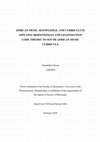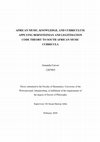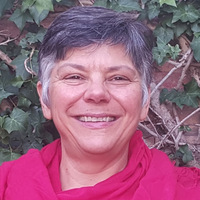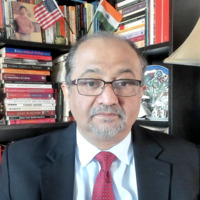Papers by Mandy Carver

This thesis considers the recontextualisation of African music in formal South African curricula.... more This thesis considers the recontextualisation of African music in formal South African curricula. The research is situated in South Africa, where post-apartheid education policy promotes the inclusion of indigenous knowledge in the curriculum. The research is motivated by a problem of disjuncture in the national upper secondary curriculum’s ‘Indigenous African Music’ stream. While African music is the focus, the theory of music component is drawn from Western art music and seems to have little relevance to African indigenous music practices. Identifying a fundamental clash of the practical and the theoretical in this curriculum, the thesis sets out to explore what knowledge types are included in this and one tertiary curriculum, how these are articulated, and their potential for integration, coherence and knowledge-building. African music’s place in formal curricula is relatively recent, and the literature attests that a clash between ‘Western’ and ‘African’ content is a common problem. Yet while this literature critiques Western hegemony and argues for the significance of African knowledge, little scholarly enquiry takes up the question of knowledge integration. Current trends in the philosophy of music education critique text-oriented curricula based on canonical works and promote individual experience and procedural knowledge, resulting in a binary that overlooks the fact that music exists on multiple levels at the same time. Concepts drawn from Basil Bernstein and Karl Maton highlight what counts as curriculum and make visible the ordering principles of curricula. They allow differentiation between knowledge types, practical knowledge based on performance skill, theoretical content, or axiological meanings focusing on musical significance. When these theories are brought to bear on African music curricula, the conflicts can be understood in terms of knowledge types, their differing structures and their capacity for knowledge-building. This qualitative research explores these issues in two case studies through text-based analysis and empirical research. Data was collected through document analysis, observation and interviews. Bernstein and Legitimation Code Theory (LCT) provided theoretical and analytical lenses for data coding, organisation and analysis. The study provides much needed theorising about the recontextualisation of African music. It proposes a model, developed from the theoretical implications of the research, to theorise about different knowledge types and their relationships with each other. In the curricularisation of different music practices, the model illustrates the complexity of musical knowledge, demonstrating how different knowledge domains contextualise each other. It shows the dialectic relationship between musical knowing and musical knowledge, and the importance of negotiating boundaries between knowledge types.
Call and Response 4-10 4.4 PITCH 4-11 4.4.1 Perceptions of Scales, Tuning and Pitch 4-11 4.4.2 Co... more Call and Response 4-10 4.4 PITCH 4-11 4.4.1 Perceptions of Scales, Tuning and Pitch 4-11 4.4.2 Concepts of High and Low 4-14 4.4.3 Melodies and Speech Patterns 4-14 4.5 HARMONY 4-15 4.5.1 Functional Harmony and Tonal Centres 4-15 4.5.2 Polyphony 4-16 4.6 TIMBRE AND TEXTURE 4-16 4.7 DYNAMICS 4-17 4.8 MOOD 4-18 4.9 AFRICAN ELEMENTS OF MUSIC 4-19 4.10 NOTATION 4-20 4.10.1 Historical use of Staff Notation and Tonic Sol-fa Notation 4-21 4.10.2 Problems of Western Notation 4-22
African Music, 2017
The need for redress in South African education includes calls for the decolonisation of the curr... more The need for redress in South African education includes calls for the decolonisation of the curriculum. In music education, this could imply a straight forward swap of content, replacing the 'hegemonic' Western classical canon with orally transmitted musical traditions in Africa. However, the picture clouds somewhat when the epistemological framework of the discipline of (Western) music is retained for the 'decolonised' curriculum, as this results in a disjuncture between the practice of African music and the way it is understood on a conceptual level in the curriculum. Drawing on the theories of Basil Bernstein and Karl Maton, this article probes the nature of the knowledge articulated in the South African secondary school, the basis of its specialisation, and its potential to equip students with knowledge that allows boundary crossing.

African Music : Journal of the International Library of African Music, 2019
Scholarly debate on music education on the African continent is largely confined to journal artic... more Scholarly debate on music education on the African continent is largely confined to journal articles and post graduate theses. A publication such as this volume of essays, edited by Emily Achieng' Akuno has the potential to distil the various ideas and approaches into a potent "brew" and weave the different threads from across the continent to reveal its inherent patterns. Such a volume would constitute a landmark in the field. However, this collection of essays disappoints on different levels. The title suggests a volume with both a theoretical and practical perspective on music education in Africa. While both are present, the book's lack of internal organisation means that the words of its subtitle, "concept, process, and practice" are never defined or satisfactorily explored. In fact, by the end of the volume, this reader was still not sure what each meant, and whether they were the same or different from one other. This is a pity, as the field is crying out for cogent, consistent scholarship in both theory and practice.
Songs of the Dinka of South Sudan. 2012. Recorded by Elizabeth Achol Ajuet Deng, Simon Yak Deng Yak and Tatiana Reid. Annotated and produced by Angela Impey. 44 pp. of notes, Dinka song texts with translations into English, 5 colour photographs. 1 compact disc, 20 tracks. ; Dance To Th e Drum Of ...
African Music: Journal of the International Library of African Music
Theory of African Music Volumes I and II. Gerhard Kubik. 2010. Chicago: University of Chicago Press. Vol I, 464 pp., Vol II, 359 pp
African Music: Journal of the International Library of African Music, 2011
MASTERS OF THE BALAFON, 2001, 2002. by Hugo Zemp. Colour, DVD Series. Produced by Selenium Films, distributed by Educational Resources (www.der.org)
African Music: Journal of the International Library of African Music, 2010
AIDS, Politics and Music in South Africa. Fraser G. McNeill. 2011. Cambridge: Cambridge University Press. 278 pp
African Music: Journal of the International Library of African Music, 2012
On The Rumba River. 2008. By Jacques Sarasin. 82 minutes, colour, DVD. Distributed by First Run Features
African Music: Journal of the International Library of African Music, 2011
AIDS, Politics and Music in South Africa. Fraser G. McNeill. 2011. Cambridge: Cambridge University Press. 278 pp
African Music: Journal of the International Library of African Music, 2012
African Music, 2017
The need for redress in South African education includes calls for the decolonisation of curricul... more The need for redress in South African education includes calls for the decolonisation of curriculum. In music education, this could imply a straight forward swap of content, replacing the ‘hegemonic’ Western classical canon with orally transmitted musical traditions in Africa. However, the picture clouds somewhat when the epistemological framework of the discipline of (Western) music is retained for the ‘decolonised’ curriculum, as this results in a disjuncture between the practice of African music, and the way it is to be understood on a conceptual level in the curriculum. Drawing on the theories of Basil Bernstein and Karl Maton, this paper probes the nature of the knowledge articulated in the South African secondary school, the basis of its specialisation, and its potential to equip students with knowledge that allows boundary crossing.
Marimba Paedeia: Discovering African Musical Values Through Marimba Ensembles
Thesis Chapters by Mandy Carver

PhD Thesis, 2020
This thesis considers the recontextualisation of African music in formal South African curricula.... more This thesis considers the recontextualisation of African music in formal South African curricula. The research is situated in South Africa, where post-apartheid education policy promotes the inclusion of indigenous knowledge in the curriculum. The research is motivated by a problem of
disjuncture in the national upper secondary curriculum’s ‘Indigenous African Music’ stream. While African music is the focus, the theory of music component is drawn from Western art music and
seems to have little relevance to African indigenous music practices. Identifying a fundamental clash of the practical and the theoretical in this curriculum, the thesis sets out to explore what knowledge
types are included in this and one tertiary curriculum, how these are articulated, and their potential for integration, coherence and knowledge-building. African music’s place in formal curricula is
relatively recent, and the literature attests that a clash between ‘Western’ and ‘African’ content is a common problem. Yet while this literature critiques Western hegemony and argues for the
significance of African knowledge, little scholarly enquiry takes up the question of knowledge integration. Current trends in the philosophy of music education critique text-oriented curricula based on canonical works and promote individual experience and procedural knowledge, resulting in a binary that overlooks the fact that music exists on multiple levels at the same time.
Concepts drawn from Basil Bernstein and Karl Maton highlight what counts as curriculum and make visible the ordering principles of curricula. They allow differentiation between knowledge types,
practical knowledge based on performance skill, theoretical content, or axiological meanings focusing on musical significance. When these theories are brought to bear on African music curricula, the conflicts can be understood in terms of knowledge types, their differing structures and their capacity for knowledge-building. This qualitative research explores these issues in two case studies through text-based analysis and empirical research. Data was collected through document
analysis, observation and interviews. Bernstein and Legitimation Code Theory (LCT) provided theoretical and analytical lenses for data coding, organisation and analysis.
The study provides much needed theorising about the recontextualisation of African music. It proposes a model, developed from the theoretical implications of the research, to theorise about different knowledge types and their relationships with each other. In the curricularisation of different music practices, the model illustrates the complexity of musical knowledge, demonstrating how different knowledge domains contextualise each other. It shows the dialectic relationship between musical knowing and musical knowledge, and the importance of negotiating boundaries between knowledge types.
Books by Mandy Carver

Facing both ways: Knowers, Knowledge, and Bernstein's Pedagogic Rights in Music Education
Sociological Thinking in Music Education: International Intersections, 2022
British sociologist of education Basil Bernstein described his three pedagogic rights as the cond... more British sociologist of education Basil Bernstein described his three pedagogic rights as the conditions for democracy in education. This chapter considers these inter-related rights with reference to one South African tertiary music curriculum and interrogates the reasons for the opposing interpretations they have received in music education scholarship. Enlisting Bernstein’s articulation of boundaries, it explores how boundary strength can enable or constrain both access to music education and fluent control over abstract musical concepts. The chapter suggests that foregrounding procedural, experiential understanding does not guarantee fluency with conceptual frameworks and argues that such fluency is the basis of critical musicality and democratic education.











Uploads
Papers by Mandy Carver
Thesis Chapters by Mandy Carver
disjuncture in the national upper secondary curriculum’s ‘Indigenous African Music’ stream. While African music is the focus, the theory of music component is drawn from Western art music and
seems to have little relevance to African indigenous music practices. Identifying a fundamental clash of the practical and the theoretical in this curriculum, the thesis sets out to explore what knowledge
types are included in this and one tertiary curriculum, how these are articulated, and their potential for integration, coherence and knowledge-building. African music’s place in formal curricula is
relatively recent, and the literature attests that a clash between ‘Western’ and ‘African’ content is a common problem. Yet while this literature critiques Western hegemony and argues for the
significance of African knowledge, little scholarly enquiry takes up the question of knowledge integration. Current trends in the philosophy of music education critique text-oriented curricula based on canonical works and promote individual experience and procedural knowledge, resulting in a binary that overlooks the fact that music exists on multiple levels at the same time.
Concepts drawn from Basil Bernstein and Karl Maton highlight what counts as curriculum and make visible the ordering principles of curricula. They allow differentiation between knowledge types,
practical knowledge based on performance skill, theoretical content, or axiological meanings focusing on musical significance. When these theories are brought to bear on African music curricula, the conflicts can be understood in terms of knowledge types, their differing structures and their capacity for knowledge-building. This qualitative research explores these issues in two case studies through text-based analysis and empirical research. Data was collected through document
analysis, observation and interviews. Bernstein and Legitimation Code Theory (LCT) provided theoretical and analytical lenses for data coding, organisation and analysis.
The study provides much needed theorising about the recontextualisation of African music. It proposes a model, developed from the theoretical implications of the research, to theorise about different knowledge types and their relationships with each other. In the curricularisation of different music practices, the model illustrates the complexity of musical knowledge, demonstrating how different knowledge domains contextualise each other. It shows the dialectic relationship between musical knowing and musical knowledge, and the importance of negotiating boundaries between knowledge types.
Books by Mandy Carver
disjuncture in the national upper secondary curriculum’s ‘Indigenous African Music’ stream. While African music is the focus, the theory of music component is drawn from Western art music and
seems to have little relevance to African indigenous music practices. Identifying a fundamental clash of the practical and the theoretical in this curriculum, the thesis sets out to explore what knowledge
types are included in this and one tertiary curriculum, how these are articulated, and their potential for integration, coherence and knowledge-building. African music’s place in formal curricula is
relatively recent, and the literature attests that a clash between ‘Western’ and ‘African’ content is a common problem. Yet while this literature critiques Western hegemony and argues for the
significance of African knowledge, little scholarly enquiry takes up the question of knowledge integration. Current trends in the philosophy of music education critique text-oriented curricula based on canonical works and promote individual experience and procedural knowledge, resulting in a binary that overlooks the fact that music exists on multiple levels at the same time.
Concepts drawn from Basil Bernstein and Karl Maton highlight what counts as curriculum and make visible the ordering principles of curricula. They allow differentiation between knowledge types,
practical knowledge based on performance skill, theoretical content, or axiological meanings focusing on musical significance. When these theories are brought to bear on African music curricula, the conflicts can be understood in terms of knowledge types, their differing structures and their capacity for knowledge-building. This qualitative research explores these issues in two case studies through text-based analysis and empirical research. Data was collected through document
analysis, observation and interviews. Bernstein and Legitimation Code Theory (LCT) provided theoretical and analytical lenses for data coding, organisation and analysis.
The study provides much needed theorising about the recontextualisation of African music. It proposes a model, developed from the theoretical implications of the research, to theorise about different knowledge types and their relationships with each other. In the curricularisation of different music practices, the model illustrates the complexity of musical knowledge, demonstrating how different knowledge domains contextualise each other. It shows the dialectic relationship between musical knowing and musical knowledge, and the importance of negotiating boundaries between knowledge types.